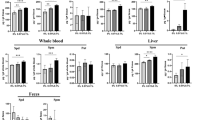Abstract
Long chain fatty acids (LCFAs) appear to be powerful stimulants for small bowel adaptation in patients with short bowel syndrome (SBS). However, the dietary lipid content may alter intestinal lipid transport. The aim of this study was to investigate the effects of a high fat diet (HFD) on in vivo lipid absorption and molecular and cellular mechanisms of LCFAs uptake by the remaining bowel. Male Sprague-Dawley rats (240–280) were randomly assigned to one of three groups: sham rats fed normal chow (sham-NC), SBS rats fed NC (SBS-NC) and SBS rats fed HFD (SBS-HFD). SBS rats underwent a 75% small bowel resection. Rats were sacrificed on day 3 or 14. Body weight, fat intake and fat clearance (total fecal fat) were measured twice a week. Fat absorbability was calculated as intake minus clearance and was expressed as percent of intake. Total RNA from the mucosa of duodenum, jejunum and ileum was extracted using TRIZOL Reagent. Northern blot analysis was performed to determine FAT/CD36 mRNA levels. Enterocyte LCFA transport was measured on day 14. LCFA uptake was determined by measuring cellular [3H]-oleate uptake over time (4–120 s). Mean (±SE) FAT/CD36 mRNA levels and oleate uptake kinetic parameters were analyzed using ANOVA. Fat absorbability diminished after bowel resection, suggesting fat malabsorption. Remaining bowel in SBS-NC rats responded by an increase in FAT/CD36 mRNA levels in the duodenum and ileum on day 3, and the duodenum and jejunum on day 14 compared to sham-NC animals, and was accompanied by an increase in enterocyte LCFA transport in all segments. Exposure to a HFD for 14 days resulted in significantly increased fat absorbability after 3 days compared to SBS-NC rats. However, FAT/CD36 mRNA levels (vs. SBS-NC) decreased in all segments on day 3. On day 14, FAT/CD36 mRNA levels were decreased in the duodenum and ileum and were accompanied by reduced oleate uptake by isolated enterocytes in the ileum (vs. SBS-NC). In a rat model of SBS, early high fat diet increased lipid absorptive capacity of the intestinal remnant as seen by increased fat absorbability. The main mechanisms of this effect may be an acceleration of structural intestinal adaptation resulting in an increased number of enterocytes. However, at molecular and cellular levels HFD decreased mucosal FAT/CD36 mRNA levels and oleic acid uptake by isolated enterocytes.



Similar content being viewed by others
Change history
19 May 2021
A Correction to this paper has been published: https://doi.org/10.1007/s00383-021-04924-z
References
Vanderhoof JA (1996) Short bowel syndrome. Neonatal gastroenterology 23:377–386
Coran AG, Spivak D, Teitelbaum DH (1999) An analysis of the morbidity and mortality of short bowel syndrome in the pediatric age group. Eur J Pediatr Surg 9:228–230
Mayr JM, Schober PH, Weißensteiner U, Höllwarth ME (1999) Morbidity and mortality of the short-bowel syndrome. Eur J Pediatr Surg 9:231–235
Hamilton JA (1998) Fatty acid transport: difficult or easy? J Lipid Res 39:467–481
Stremmel W, Lotz G, Strohmeyer G, Berk PD (1985) Identification, isolation, and partial characterization of a fatty acid binding protein from jejunal microvillous membranes. J Clin Invest 75:1068–1076
Schoeller C, Keelan M, Mulvey G, Stremmel W, Thomson ABR (1995) Oleic acid uptake into rat and rabbit jejunal brush border membrane. Biochim Biophys Acta 1236:51–64
Gork S, Zdanowski A, Gorlin A, Corie H, Chen M, Harmon CM (1999) Upregulation of fatty acid translocase and increased fatty acid transport in isolated enterocytes during intestinal adaptation in a rat with SBA. Surgical Forum vol L:565–567
Henry RJ, Cannon DC, Winkelman JW (1974) Clinical chemistry: principles and techniques. Harper and Row, Hagenstown, MD, pp 1481–1483
Wilson MD, Blake WL, Salati LM, et al (1990) Potency of polyunsaturated and saturated fats as short-term inhibitors of hepatic lipogenesis in rats. J Nutr 120:544–552
Chomczynski P, Sacchi N (1987) Single step method of RNA isolation by acid guanidium- thiocyanate-phenol-chloroform extraction. Anal Biochem 162:156–159
Goré J, Hoinard C (1993) Linoleic acid transport in hamster intestinal cells is carrier-mediated. J Nutr 123:66–73
Abumrad NA, Harmon CM, Ibrahimi A (1998) Membrane transport of long-chain fatty acids: evidence for a facilitated process. J Lipid Res 39:2309–2318
Harmon CM, Luce P, Beth A, Abumrad NA (1991) Labeling of adipocyte membranes by sulfo-N-succinimdyl derivates of long chain fatty acids: inhibition of fatty acid transport. J Membr Biol 124:261–268
Park JHY, Grandjean CJ, Hart MH, Baylor JM, Vanderhoof JA (1989) Effects of dietary linoleic acid on mucosal adaptation after small bowel resection. Digestion 44:57–65
Vanderhoof JA, Park JHY, Herrington MK (1994) Effects of dietary menhaden oil on mucosal adaptation after small bowel resection in rats. Gastroenterology 106:94–99
Author information
Authors and Affiliations
Corresponding author
About this article
Cite this article
Sukhotnik, I., Gork, A.S., Chen, M. et al. RETRACTED ARTICLE: Effect of a high fat diet on lipid absorption and fatty acid transport in a rat model of short bowel syndrome. Ped Surgery Int 19, 385–390 (2003). https://doi.org/10.1007/s00383-003-1016-3
Accepted:
Published:
Issue Date:
DOI: https://doi.org/10.1007/s00383-003-1016-3




